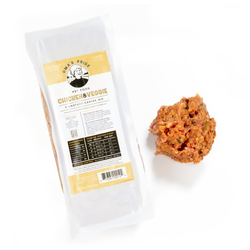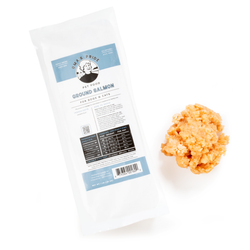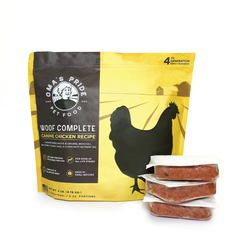Everything You Need to Know: Chicken Hearts for Dogs
If you’re a pet parent, you may have seen people on social media giving their dogs raw bones and organs…even chicken hearts.
You wonder, “Should I be doing the same?”
The answer: yes! Organ meat helps many dogs live longer, healthier lives because they are packed with vitamins and nutrients. Feeding chicken hearts to dogs as part of a balanced diet can help strengthen the immune system, support heart and blood health, and more.
Read on to learn more about chicken hearts for dogs, including health benefits, how to feed hearts, how much to feed, and where to buy them.
Where to buy chicken hearts for dogs and cats
If you’re looking to purchase nutritionist-recommended chicken hearts, you can do so directly online through Oma’s Pride. Oma’s Pride chicken hearts are:
- Crafted from freeze-dried, hand-sliced chicken hearts
- Chicken is antibiotic-free and USA-sourced
- A nutrient-dense superfood
- Powered by 100% real, whole foods
- Always free from additives, by-products, grains, corn, soy, sugar, or other fillers
- 100% raw (no HPP)
Oma’s Pride has an extensive collection of chicken heart products to choose from!
Explore Products
1. Freeze-dried raw
Freeze-dried chicken hearts are a great way to give your dog all the health benefits without worrying about gooey messes or quick expiration dates. Freeze drying naturally preserves more than 90% of nutrients and makes food shelf-stable for extended periods.
Buy freeze-dried Chicken Hearts in a 4 oz or 16 oz bag. For both dogs and cats.
2. Frozen raw
You can take the pressure and worry out of feeding your dog a raw diet with canine recipes and mixes with chicken hearts.
- Option 1: Buy the Chicken & Veggie Signature Mix for dogs only (1 lb or 5 lb). Meant for supplemental or intermittent feeding and crafted from USA-sourced chicken, organs, bones & select veggies.
- Option 2: Purchase the Ground Chicken Organ Blend with hearts and gizzard (1 lb). Cats and dogs can enjoy this blend!
- Option 3: Buy a Woof Complete Dog Chicken Recipe with chicken hearts inside (4 lb). This option is for dogs only. These are complete meals that exceed AAFCO canine nutritional standards for all life stages.
How do I prepare chicken hearts for my dog?
You can serve chicken hearts to dogs and cats as a treat, a nutritional topper, or as part of a larger meal. If your dog or cat has never eaten chicken heart, I recommend starting slowly by introducing only one new food at a time (in small amounts).
Once your dog or cat tries the new food, wait to see how they react. If I don’t see any severe negative symptoms, I continue giving the new food for several days until they have solid stools.
If you’re concerned about introducing a new food, consider adding a supplement to aid with the transition. I recommend Digestive Performance supplement, slippery elm, pumpkin, or bone broth.
The main health benefits of chicken hearts

Sadly, cardiac arrest and heart disease are common causes of death amongst dogs. However, as pet parents, we can proactively prevent these issues by feeding our dogs nutrient-dense foods.
Chicken hearts are one such food to consider because they are packed with nutrients like taurine and omega-3 fatty acids.
Note! Taurine supports your dog's heart by regulating blood flow and strengthening the heart's walls. Omega-3 fatty acids can reduce inflammation and lower blood pressure.
Studies show that these nutrients help prevent and treat heart issues in dogs. The benefits often include a longer lifespan and better quality of life with fewer symptoms and less suffering.
In short, chicken hearts for dogs could lead to a longer and happier life for your pup, with a stronger and healthier heart. Similarly, feeding your dog liver and kidney will benefit your dog's liver and kidneys—it's really that simple! As a Certified Canine Nutritionist, this is how I feed my dogs.
Other vitamins and minerals in chicken hearts
Chicken hearts are packed with many essential vitamins and minerals. Incorporating them into your dog's bowl can strengthen the body in many ways.
Zinc
Chicken hearts are a natural source of zinc, making it easier for the body to absorb and utilize nutrients than synthetic sources.
Zinc is essential for healthy cell function and immunity. It also has visible effects on skin health. Many skin disorders cause dogs' skin to become cracked and sore, often due to zinc deficiencies.
Zinc deficiencies can negatively impact dogs by affecting vision, social behavior, and reproductive health (especially in male dogs).
You can help combat zinc deficiencies in your pup's diet by feeding them chicken hearts.
Vitamin B12 and iron
Chicken hearts are a good source of iron. Iron is essential for maintaining a high red blood cell count and supporting collagen production, which is crucial for healthy skin, strong immunity, and healthy DNA.
Vitamin B12, also known as cobalamin, is found in high concentrations in organ meats, such as chicken hearts.
If your dog becomes deficient in Vitamin B12, it can lead to a wide range of issues, including poor digestion, a weakened immune system, and declining cognitive function.
There is also a connection between Vitamin B12 and iron: a deficiency in Vitamin B12 can lead to an iron deficiency. This iron deficiency can lead to anemia, which means your dog’s red blood cell count is dangerously low.
Symptoms of iron deficiency include:
- Pale gums
- Rapid heartbeat
- Fast breathing
- Lethargy
- Black stools
Please contact your veterinarian immediately if you notice any of these symptoms.
By adding chicken hearts to your dog’s bowl, you can provide a natural source of iron and B12 to support their overall health.
Protein
Chicken hearts are an excellent protein source, which is fantastic for growing puppies to develop to their fullest potential. They also help adult dogs maintain, repair, and restore critical bodily functions.
Overall, protein is a crucial component of a well-balanced diet. It makes up the building blocks of your dog’s body, keeping their muscles strong and organs healthy.
Can dogs eat raw chicken hearts?
Dogs are biologically adapted to eat raw meat as canines.
How is this possible? Well, dogs have much more acidic stomachs than humans, allowing them to safely eat raw organs. They thrive on the nutrients in raw dog food (similar to their wolf ancestors).
Raw organ meat is preferable for canines because cooking organs can cook off some of the most vital nutrients.
Additionally, studies show that a diet full of raw foods for dogs improves the balance of gut flora compared to a diet of processed kibble. Gut health is crucial because about 80% of your dog’s immune functioning derives from their gut. A stronger immune system decreases your dog's risk of contracting diseases, viruses, and infections.

Great for picky eaters
Finally, dogs simply love the taste of chicken hearts (this will help your picky eaters!). Dogs are natural scavengers that enjoy a variety from fresh meat to organs to raw bones. Chicken hearts are a great way to bring excitement and appetite back to a dog that’s sick of the same old food.
The connection: food allergies and chicken hearts
If your dog suffers from food allergies, raw chicken hearts are a great option to alleviate the symptoms. That's because commercially processed foods often cause food allergies. Giving your dog a more biologically appropriate food source will make them less inflamed and more able to process real, whole foods.
Frequently asked questions
1. Can chicken hearts replace a complete and balanced meal?
No, chicken hearts do not replace a complete and balanced meal. You can use chicken hearts as one part of a balanced diet, as a treat, or as a freeze-dried topper.
2. Are chicken hearts good for dogs?
Yes, chicken hearts for dogs are extremely healthy because they improve heart health and reduce inflammation. Chicken hearts contain essential vitamins, minerals, fats, and other nutrients like taurine, B12, phosphorus, fatty acids, protein, iron, and zinc.
3. If my dog is allergic to chicken, can they eat chicken hearts?
If your dog is allergic to raw chicken, they cannot eat raw chicken hearts. However, some dogs are only allergic to chicken in a cooked, processed form. Consult your veterinarian or look out for any signs or symptoms of an allergic reaction.
4. Can cats eat chicken hearts?
Yes, cats can eat chicken hearts because they are carnivores biologically adapted to process raw meat. Cats can eat freeze-dried chicken hearts or frozen chicken hearts as a treat, topper, or inside of a meal.
Leave a comment
Your email address will not be published. Required fields are marked with *




















